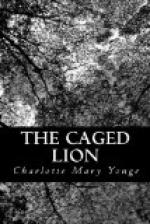Every moment that he was absent from Esclairmonde was spent in composing chivalrous discourses in which to lay himself at her feet, but the mere sight of her steady dark eyes scattered them instantly from his memory; and save for very shame he would have entreated King James again to break the ice for him, since the lady evidently supposed that she had last year entirely quashed his suit. And in this mood Malcolm mounted and took his place to ride into Paris, where the King wished to arrive in the evening, and with little preparation, so as to avoid the weary length of a state reception, with all its speeches and pageants.
In the glow of a May evening the cavalcade passed the gates, and entered the city, where the streets were so narrow that it was often impossible to ride otherwise than two and two. The foremost had emerged into an open space before a church and churchyard, when there was a sudden pause, a shock of surprise. All across the space, blocking up the way, was an enormous line of figures, looking shadowy in the evening light, and bearing the insignia of every rank and dignity that earth presented. Popes were there, with triple crown and keys, and fanned by peacock tails; scarlet-matted and caped cardinals, mitred and crosiered bishops, crowned and sceptred kings, ermined dukes, steel-clad knights, gowned lawyers, square-capped priests, cowled monks, and friars of every degree—nay, the mechanic with his tools, the peasant with his spade, even the beggar within his dish; old men, and children of every age; and women too of all grades—the tower-crowned queen, the beplumed dame, the lofty abbess, the veiled nun, the bourgeoise, the peasant, the beggar;—all were there, moving in a strange shadowy wild dance, sometimes slow, sometimes swift and mad with gaiety, to the music of an unseen band of clashing kettle-drums, cymbals, and other instruments, that played fast and furiously; while above all a knell in the church tower rang forth at intervals a slow, deep, lugubrious note; and all the time there glided in and out through the ring a grisly being—skull-headed, skeleton-boned, scythe in hand—Death himself; and ever and anon, when the dance was swiftest, would he dart into the midst, pounce on one or other, holding an hour-glass to the face, unheeding rank, sex, or age, and bear his victim to the charnel-house beside the church. It was a sight as though some terrible sermon had taken life, as though the unseen had become visible, the veil were taken away; and the implicit unresisting obedience of the victims added to the sense of awful reality and fatality.
The advance of the victorious King Henry made no difference to the continuousness of the frightful dance; nay, it was plain that he was but in the presence of a monarch yet more victorious than himself, and the mazes wound on, the performers being evidently no phantoms, but as substantial as those who beheld them; nay, the grisly ring began to absorb the royal suite within itself, and an awe-stricken silence prevailed—at least, where Malcolm Stewart and Ralf Percy were riding together.




